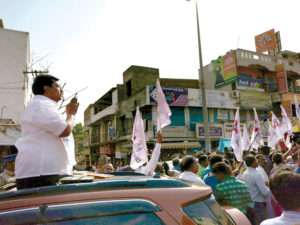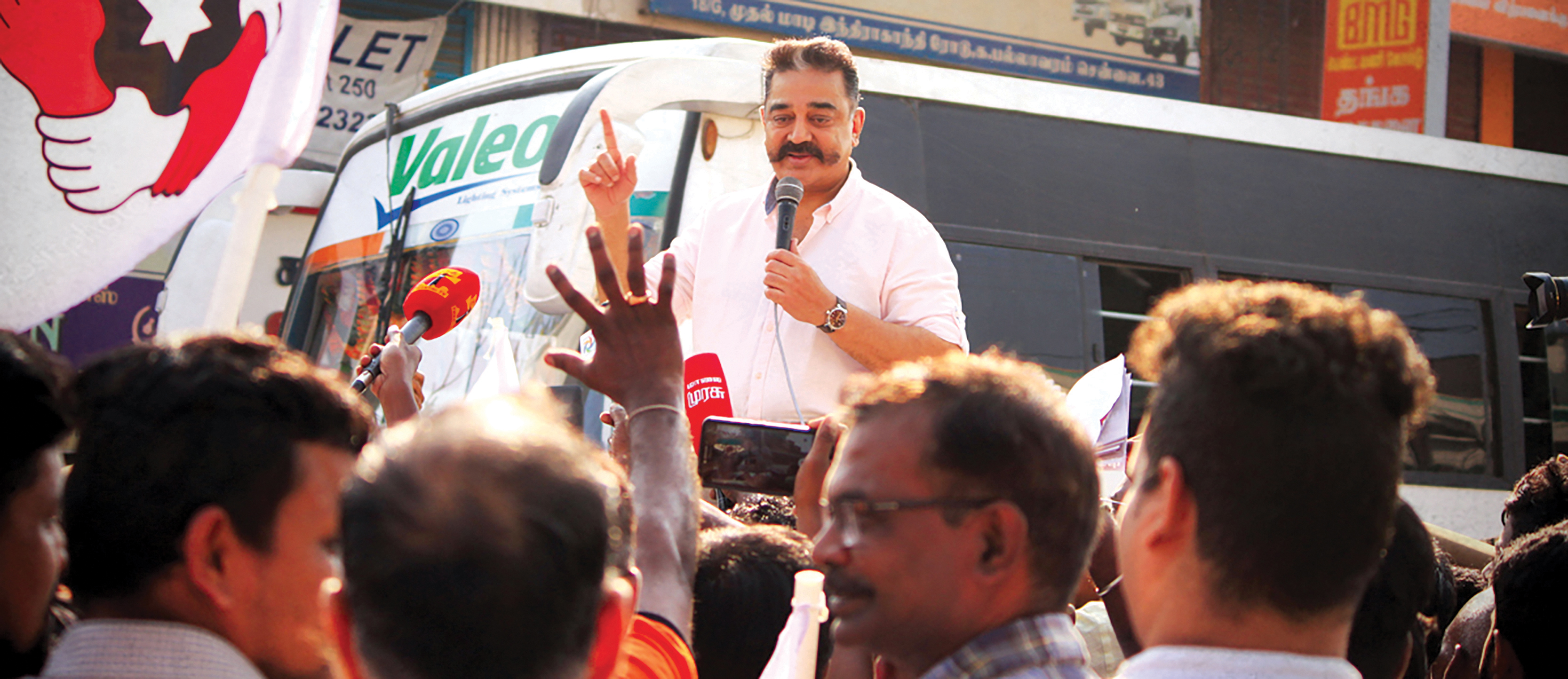Kamal Haasan is canvassing for his candidates while saving himself for Assembly elections, but observers are treating him with caution
Emerging out of the sun-roof of his SUV, Kamal Haasan seems fresh and ready for the next 15 days of election campaigning under the merciless Tamil Nadu sun. However, he didn’t seem to have anything new to say. Introducing his party Makkal Needhi Maiam’s (MNM) candidate for Sriperumbudur to the crowd gathered in Chennai’s southern neighbourhood of Pallavaram, he said: “I will ensure that he does his work properly. If you give any complaints, you can be assured that they will reach me.”

In another car a few metres away, the candidate M Sreedhar was mostly used as a prop. Standing with his hands folded in the air, he did not have much to say. All eyes were clearly on Kamal Hasaan, the movie star. “Pallavaram has changed, the city has changed. You also have to change and vote for differently,” Haasan said, appealing to the crowd to come out to vote. His party will contest all 40 constituencies in Tamil Nadu, including one in Puducherry. He has made it clear he will not form alliances with any party in the state, while he promised support and campaign for the Trinamool Congress in the Andaman and Nicobar islands.
Continuing with Tamil Nadu’s history with politics and cinema, Kamal Haasan is trying to tread the path set by former chief ministers like MG Ramachandran, M Karunanidhi and J Jayalalithaa. “I have been his follower for decades now,” says CT Ganesan, who is making rotis in a restaurant nearby. “Not just through his movies, but also through speeches I can understand that he does not discriminate on the lines of religion and caste, nor favour the rich over the poor.”
While fans are rejoicing his entry into politics, others are watching Haasan with caution. “I am still not clear what he wants and what he is promising to the state. There was no time for us to understand,’’ says R Vadivelu, a fruit vendor in Aminijikarai. “I still think he might be an alternative to the two parties we have currently.”
With the larger-than-life personalities of Tamil Nadu—Karunanidhi and Jayalalithaa—dying within 20 months of each other, both Rajnikanth and Kamal Haasan were quick to make their political ambitions public. While the former has not even named his party and has chosen to stay out of the upcoming Lok Sabha elections, the latter was quick to jump into the fray. But as Vadivelu points out: “Between his announcement (of joining politics) and actually contesting, he did not make his stance clear on specific issues. How can I vote for him?”
The party’s manifesto offers a seven-point agenda, including providing 50 lakh jobs in five years, setting up 500 skill development centres, and 100 per cent profit for farmers. “We are in the process of positioning ourselves as a ‘seek and solve’ party. The agenda is to seek the problems and issues faced by the people and offer feasible solutions. Honesty, integrity, hard work and discipline are our USPs, which our party president Kamal Haasan has stood for throughout his illustrious movie career,” says the party’s spokesperson, without going into any specifics. The spokesperson did not want to be named.
The leader of the Opposition, MK Stalin, refuses to even acknowledge Kamal Haasan as a politician. Soon after Kamal Haasan publicised his political ambitions, MK Stalin said, “Owing to seasonal changes, some flowers may suddenly bloom and later wither. Similarly, in Tamil Nadu’s political arena too, glamorous paper flowers may bloom”—an obvious reference to actors trying to break into the state’s political scene.
A senior politician with the governing All India Anna Dravida Munnetra Kazhagam party said there was no comparison. On condition of anonymity, he says, “MGR was a cultural identity. He was a brand himself. No new actor can imagine occupying that space.”
But Haasan isn’t taking these jibes lying down. While the high-energy and public “official” campaigning began earlier last week, he’s been travelling across the state for several months, often working with activists, environmentalists and former leaders at the ground level. His party’s name was announced on February 21, 2018, from the former president APJ Abdul Kalam’s house in Ramanathapuram, which was followed by a four-day tour across districts, primarily talking to the fishing community.
“He is trying hard to understand the pulse of the people and how democracy works. It is very obvious that he concerned about the welfare of the state and is aware of how bad our political systems are. He is very ambitious and highly motivated. But translating this ambition and concern to an election strategy and win votes is going to be difficult,” says R Elango, a former Dalit panchayat president of Kuthambakkam, some 30 km west of Chennai. Between 1996 and 2006, Elango is credited to have brought in self-governance by reducing caste clashes, illegal liquor and providing employment opportunities in Kuthambakkam.
Elango says, “He wants to understand if direct democracy works by interaction with people without the glare of the local and national media. However, there is a real risk of him becoming like any other party—where hierarchy is strong and functions with a top-heavy attitude. To stand out and make a real difference, he needs to be a leader who is not afraid to stand behind others. He cannot build or let a cult status to be built around him.”
Haasan’s ambitions were perhaps made clear when he decided not to personally contest for the coming election. Instead, he’s using his star power to canvass for his candidates while saving himself for something bigger—occupying the chief minister’s chair. “The history of Tamil Nadu politics is rife with strong stars like MGR and Karunanidhi who have never been to the MP elections as candidates as their focus was Tamil Nadu. But they have been successful MLAs and therefore Chief Ministers later. A similar path is being taken by Kamal Haasan,” said the party’s spokesperson.
Kamal Haasan was perhaps the first actor to disband his fan clubs and rebrand them as welfare associations. The fans see themselves as being part of a movement rather than just passive supporters of his political ambitions. “At this juncture, they have another avenue where they can enrol themselves in the party and work together as volunteers, to expand the arena of good deeds,” said the party’s spokesperson. The party also said that members who have been part of the welfare association for more than 30 years were given preference as office-bearers.
M Subramanian, the former mayor of Chennai from the DMK and a seasoned politician, says he loves Kamal Haasan’s movies but doesn’t think his star power will translate to political power. “MGR and Karunanidhi used cinema as a political tool. People were expecting the transition to happen. Karunanidhi was a gifted writer and used cinema to express his politics from a very young age. However, Kamal Haasan, while making quality movies, never spoke about his political ambitions till there was an apparent power vacuum. The people of Tamil Nadu can see that clearly.”
www.newslaundry.com





